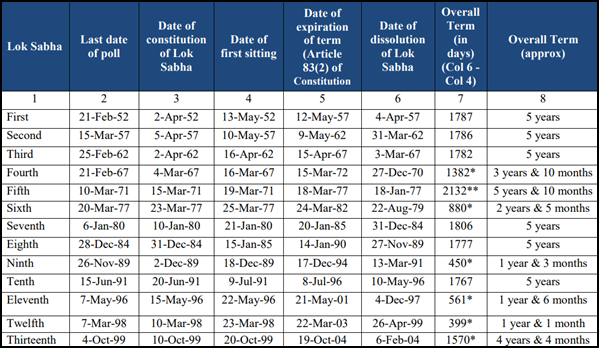One Nation, One Election Bill

- 13 Dec 2024
In News:
The One Nation, One Election Bill has made significant progress in India, passing the Lok Sabha with 269 votes in favor and 198 votes against. The bill proposes the synchronization of elections for the Lok Sabha, State Legislative Assemblies, and local bodies (Panchayats and Municipalities), aiming to streamline the electoral process, reduce costs, and enhance governance.
Key Updates:
- The bill has been approved by the Union Cabinet and will be reviewed by a Joint Parliamentary Committee (JPC), whose report will be presented for further approval and discussion in Parliament.
- The process will unfold in two phases:
- Phase 1: Simultaneous elections for the Lok Sabha and State Legislative Assemblies.
- Phase 2: Synchronizing local body elections (Panchayats and Municipalities) within 100 days of the general elections.
Historical Context:
- 1951-1967: India previously conducted simultaneous elections for the Lok Sabha and State Assemblies until disruptions, such as premature dissolutions of assemblies, led to staggered elections after 1967.
- The One Nation One Election concept has been revived to address inefficiencies in the current system, especially the high cost of conducting frequent elections.
Advantages of the One Nation, One Election Bill:
- Cost Reduction: Synchronizing elections can significantly lower the financial burden by eliminating the need for multiple election cycles, reducing the deployment of resources like security personnel and election staff.
- Long-Term Governance Focus: Politicians can prioritize governance and policy implementation rather than election campaigning, fostering long-term stability.
- Increased Voter Turnout: Voter fatigue, caused by frequent elections, may reduce, leading to higher turnout as elections occur less often.
- Fairer Political Competition: Smaller regional parties could have a better chance to compete with larger national parties by reducing election-related costs.
- Efficient Use of Resources: Security forces and administrative resources can be deployed more effectively, avoiding the redundancy caused by multiple election cycles.
Disadvantages of the One Nation, One Election Bill:
- Synchronization Challenges: Aligning elections across a vast and diverse country like India, especially in states with unstable political situations, may prove difficult.
- Federalism Concerns: The implementation may require constitutional changes that could impact India's federal structure, potentially limiting the autonomy of states in election matters.
- Impact on Regional Issues: National issues could overshadow regional concerns, diluting the focus on state-specific matters.
- Challenges for Regional Parties: Larger national parties may dominate the electoral landscape, reducing the influence of regional parties and undermining the federal nature of the political system.
- Accountability Risks: Fixed terms without frequent elections might reduce public scrutiny of elected officials, affecting their accountability.
Constitutional Amendments Required:
The implementation of One Nation, One Election requires amendments to several key constitutional provisions:
- Article 83: Regarding the duration of the Lok Sabha, amendments are needed to synchronize the timing of dissolution.
- Article 85: Deals with the sessions and dissolution of Parliament, which needs to be aligned with the new system.
- Article 172: Pertains to the duration of State Legislatures, requiring amendments for synchronization.
- Article 174: Similar to Article 85, it governs the sessions and dissolution of State Legislatures, needing standardization.
Implementation Challenges:
- Logistical Complexity: Conducting simultaneous elections would require immense logistical coordination, including vast numbers of electronic voting machines and trained personnel.
- Political Accountability: Fixed terms may reduce the accountability that frequent elections bring, potentially leading to governance stagnation.
- Impact on Federalism: Amendments to the Constitution regarding state legislatures might face resistance from states concerned about their autonomy.
